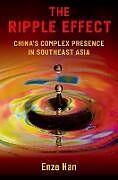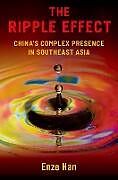The Ripple Effect
Einband:
Kartonierter Einband
EAN:
9780197696590
Genre:
History
Autor:
Han Enze
Herausgeber:
Oxford University Press
Erscheinungsdatum:
19.06.2024
Thematically imaginative and empirically illuminating, The Ripple Effect unpacks the complex nuances behind China's ubiquitous but ambivalent presence in Southeast Asia. Enze Han masterfully reminds us that while size does matter and historical memories are always complicated among neighbors, the effects of asymmetry and proximity are rarely straightforward, but ambiguous, multifaceted, and uncertain. Intended or not, China's action and interactions with smaller neighbors at state, sub-national, or societal levels are bound to affect their present and future ties. This book is a must-read for those interested in understanding China-Southeast Asia relations and the paradoxes of influence in international politics.
Autorentext
Enze Han is Associate Professor in the Department of Politics and Public Administration at the University of Hong Kong. He is the author of Asymmetrical Neighbors: Borderland State Building between China and Southeast Asia and Contestation and Adaptation: The Politics of National Identity in China. During 2015-2016, he was a Friends Founders' Circle Member of the School of Social Science at the Institute for Advanced Study in Princeton, United States. He was also the Distinguished Fellow on Contemporary Southeast Asia by the Lee Kong Chian NUS-Stanford Initiative on Southeast Asia in 2021.
Klappentext
In The Ripple Effect, Enze Han argues that a focus on the Chinese state alone is not sufficient for a comprehensive understanding of China's influence in Southeast Asia. Instead, we must look beyond the Chinese state, to non-state actors from China, such as private businesses and Chinese migrants. These actors affect people's perception of China in a variety of ways, and they often have wide-ranging as well as long-lasting effects on bilateral relations. Han proposes that to understand this increasingly globalized China, we need more conceptual flexibility regarding which Chinese actors are important to China's relations, and how they wield this influence, whether intentional or not.
Zusammenfassung
Many studies of China's relations with and influence on Southeast Asia tend to focus on how Beijing has used its power asymmetry to achieve regional influence. Yet, scholars and pundits often fail to appreciate the complexity of the contemporary Chinese state and society, and just how fragmented, decentralized, and internationalized China is today. In The Ripple Effect, Enze Han argues that a focus on the Chinese state alone is not sufficient for a comprehensive understanding of China's influence in Southeast Asia. Instead, we must look beyond the Chinese state, to non-state actors from China, such as private businesses and Chinese migrants. These actors affect people's perception of China in a variety of ways, and they often have wide-ranging as well as long-lasting effects on bilateral relations. Looking beyond the Chinese state's intentional influence reveals many situations that result in unanticipated changes in Southeast Asia. Han proposes that to understand this increasingly globalized China, we need more conceptual flexibility regarding which Chinese actors are important to China's relations, and how they wield this influence, whether intentional or not. The Ripple Effect makes the case that to understand China's relationship with Southeast Asia, it is necessary to move beyond a narrow fixation on the Chinese state by scrutinizing the ordinary manifestations of China's presence in the region and recognizing the multifaceted web of actors and their effects on the dynamics between the two regions.
Inhalt
Acknowledgements
List of Abbreviations
Chapter 1: China's Complex Presence
Chapter 2: Authoritarian Resilience
Chapter 3: Trade, Investment, and Economic Influence
Chapter 4: Contesting "Re-Sinicization"
Chapter 5: Chinese Consumption
Chapter 6: Illicit Political Economy
Chapter 7: Migration Encounters
Chapter 8: Diaspora Engagement
Chapter 9: Conclusion
Notes
Bibliography
Index

Leider konnten wir für diesen Artikel keine Preise ermitteln ...
billigbuch.ch sucht jetzt für Sie die besten Angebote ...
Die aktuellen Verkaufspreise von 6 Onlineshops werden in Realtime abgefragt.
Sie können das gewünschte Produkt anschliessend direkt beim Anbieter Ihrer Wahl bestellen.
Loading...
Die aktuellen Verkaufspreise von 6 Onlineshops werden in Realtime abgefragt.
Sie können das gewünschte Produkt anschliessend direkt beim Anbieter Ihrer Wahl bestellen.
| # | Onlineshop | Preis CHF | Versand CHF | Total CHF | ||
|---|---|---|---|---|---|---|
| 1 | Seller | 0.00 | 0.00 | 0.00 |
